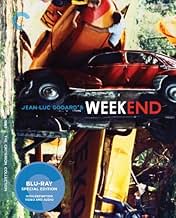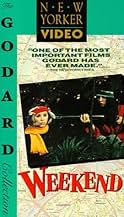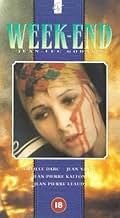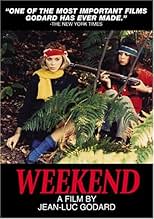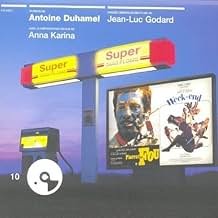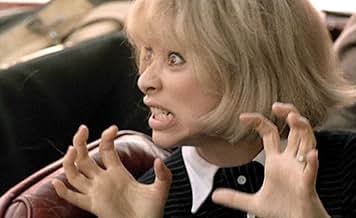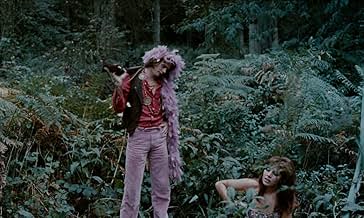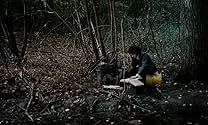IMDb रेटिंग
6.9/10
16 हज़ार
आपकी रेटिंग
विरासत के लिए पत्नी के माता-पिता को मारने के इरादे से सड़क यात्रा करने वाले एक विवाहित जोड़े की एक वास्तविक कहानी.विरासत के लिए पत्नी के माता-पिता को मारने के इरादे से सड़क यात्रा करने वाले एक विवाहित जोड़े की एक वास्तविक कहानी.विरासत के लिए पत्नी के माता-पिता को मारने के इरादे से सड़क यात्रा करने वाले एक विवाहित जोड़े की एक वास्तविक कहानी.
- निर्देशक
- लेखक
- स्टार
- पुरस्कार
- 1 जीत और कुल 4 नामांकन
Yves Afonso
- Gros Poucet
- (बिना क्रेडिट के)
Yves Beneyton
- Un membre du FLSO
- (बिना क्रेडिट के)
Juliet Berto
- Une activiste du FLSO
- (बिना क्रेडिट के)
- …
Michèle Breton
- Girl in the woods
- (बिना क्रेडिट के)
Michel Cournot
- Man From Farmyard
- (बिना क्रेडिट के)
Lex De Bruijn
- Revolutionary
- (बिना क्रेडिट के)
Jean Eustache
- L'auto-stoppeur
- (बिना क्रेडिट के)
Jean-Claude Guilbert
- Le clochard
- (बिना क्रेडिट के)
Paul Gégauff
- Le pianiste
- (बिना क्रेडिट के)
Blandine Jeanson
- Emily Bronte
- (बिना क्रेडिट के)
Louis Jojot
- Monsieur Jojot
- (बिना क्रेडिट के)
Valérie Lagrange
- La femme du chef du FLSO
- (बिना क्रेडिट के)
Jean-Pierre Léaud
- Saint-Just
- (बिना क्रेडिट के)
- …
Ernest Menzer
- Ernest - le cuisinier
- (बिना क्रेडिट के)
- …
Sanvi Panou
- Mon frère africain
- (बिना क्रेडिट के)
फ़ीचर्ड समीक्षाएं
Wow, such a polarizing film! It seems everyone either detests this work as something less than terrible or conversely praise it to the heavens. I guess I'm sadly somewhere in between. Having read a bit of theory behind the film before I saw it I won't rehash that here, only state my reaction, for if there's anything this picture cries out for it is a reaction. Well here goes. Parts are horrifying. Far more disturbing than slasher film gore (mostly because the imagery being dispensed with aren't human). Parts are boring (and NOT the ten minute tracking shot which was a gem. Has anyone even been in a traffic jam before? Godard merely replicates it and all the while makes you wonder where that couple's car is heading, and what could have caused such a jam). Parts don't make sense, mostly because I don't think they are supposed to. That is their purpose, to disrupt sense. And, surprisingly something that nobody on here has mentioned, parts are very very funny. Okay, so perhaps not everyone will laugh as often as I did, but please, lighten up kids, Godard is making fun of us, its healthy to laugh at oneself once and a while. And some of his film is just fun too. Okay, now go back to the other reviews of how hopelessly miserable you'll feel after watching this, or how much of a religious awakening this will be if your down with the art-house film-erati. Definitely worth seeing.
Yeah, it's super bizarre and it's probably Godard's strangest work (which is saying a lot) that I've seen, but I still couldn't look past the glaring flaws and just love the wonderfully surrealist images. The first hour or so of the film is pretty much perfect, combining a brutally random sense of violence with some delightfully weird fantasy images and a dark, dark sense of humour. The infamous ten minute long tracking shot of the traffic jam manages to remain entertaining throughout by linking a series of hilariously comic moments. I also especially liked the bit with the guy with the Porsche singing into a pay phone and the inexplicable appearance of Emily Brontë, who is dismissed as a fictional character and lit on fire. However, once Godard's political beliefs begin making their presence felt in an all too explicit and blatant manner, the film grinds to a halt. I was simply bored during the long monologues on America's foreign policy, which seemed a rather childish attempt by Godard to get his message across. The film never really recovers from this, as even the appearance of a group of cannibalistic revolutionaries can't bring back the same sense of black comedy that populated the first 2/3 of the film. Still, it's utterly brilliant for a majority of the time, and its bizarre images mask a mostly subtle and intelligent tirade against society and commercialism. Not for the faint-hearted, though.
Week End (1967)
** 1/2 (out of 4)
A husband (Jean Yanne) and wife (Mireille Darc), both having affairs and wanting the other dead, take a weekend trip to her dying father's house so that they can make sure they are in his will. Along the way they get in major traffic jams, get kidnapped by Jesus, run into various weirdos including a cannibal group and other strangeness. As with Godard's A Woman is a Woman, this film starts off great but quickly hits a wall and really left me cold for the final half hour or so. While I was watching the second half of the film I began to get bored very quickly and I started thinking why this was the case with the director. I'm not sure I came up with any positive answers but Godard kind of reminds me of sitting in the dark and having someone come up from behind you and scaring you. It's a great joke but he keeps on doing it to the point where it becomes tiresome and annoying. That's the feeling I got from watching this film because I loved and respected so much of it but after a while it just started to annoy me. The sequence where everything went wrong was the concert footage, which I thought just killed the mood and feel dead in its tracks. This was followed by an overly dramatic talk about blacks in America, which was then followed by a painfully long sequence dealing with the cannibals or whatever you want to call them. By the time the film ending I was rather frustrated but I guess this is just Godard being Godard. What I did enjoy about the film was the surreal and strange nature that everything is set up. There's a brilliantly done tracking shot, which goes on and on but never gets boring and in reality the sequence is quite beautiful. Godard, trying to be annoying on purpose, has everyone honking their horns for the entire scene and it really did come off funny as did all of the strange positions that the cars were in. Another great sequence happens early on when the wife talks about being seduced by another woman and her husband. This is a pretty erotic scene that's able to do more with dialogue than a lot of films do with actually showing the sexual acts. I like the way Godard demands that the viewer put themselves into the various situations but I think he, once again, goes overboard in his thoughts and ideas of the world.
** 1/2 (out of 4)
A husband (Jean Yanne) and wife (Mireille Darc), both having affairs and wanting the other dead, take a weekend trip to her dying father's house so that they can make sure they are in his will. Along the way they get in major traffic jams, get kidnapped by Jesus, run into various weirdos including a cannibal group and other strangeness. As with Godard's A Woman is a Woman, this film starts off great but quickly hits a wall and really left me cold for the final half hour or so. While I was watching the second half of the film I began to get bored very quickly and I started thinking why this was the case with the director. I'm not sure I came up with any positive answers but Godard kind of reminds me of sitting in the dark and having someone come up from behind you and scaring you. It's a great joke but he keeps on doing it to the point where it becomes tiresome and annoying. That's the feeling I got from watching this film because I loved and respected so much of it but after a while it just started to annoy me. The sequence where everything went wrong was the concert footage, which I thought just killed the mood and feel dead in its tracks. This was followed by an overly dramatic talk about blacks in America, which was then followed by a painfully long sequence dealing with the cannibals or whatever you want to call them. By the time the film ending I was rather frustrated but I guess this is just Godard being Godard. What I did enjoy about the film was the surreal and strange nature that everything is set up. There's a brilliantly done tracking shot, which goes on and on but never gets boring and in reality the sequence is quite beautiful. Godard, trying to be annoying on purpose, has everyone honking their horns for the entire scene and it really did come off funny as did all of the strange positions that the cars were in. Another great sequence happens early on when the wife talks about being seduced by another woman and her husband. This is a pretty erotic scene that's able to do more with dialogue than a lot of films do with actually showing the sexual acts. I like the way Godard demands that the viewer put themselves into the various situations but I think he, once again, goes overboard in his thoughts and ideas of the world.
10miloc
I gave this movie a 10 out of 10. I expect many people would feel hard-pressed to give it a 2 on the same scale, and I honestly wouldn't blame those who do. "Week End" is a machine built to provoke, and perhaps irritation as well as admiration can be a measure of such a machine's success.
For myself, I love it. It boils with anger, frustration, and insane energy. In one sense, it approaches film like the Cubists approached painting, breaking down images, ideas, characters and plot into startlingly photographed, almost geometric segments. But where the Cubists were to content to experiment with form Godard's instincts stay furiously political; it's as though an early Picasso had been commandeered and refitted by George Grosz.
Arrogance is not always a drawback, as rock and roll fans know-- and "Week End" is a terribly arrogant film. The director trashes every convention that he can think of. It's all thrown together-- music, dialogue, on-screen text, unvarnished political theory, frightening violence-- onto a bare hook of a plot: a young, apparently soulless couple go on a week-end trip in the middle of what appears to be the end of Western civilization. Without apologies Godard throws this mess on the table and asks the rest of us, "What have you got to match it?"
Sadly, not much. Cinema as an art has regressed rather than advanced since this film was released. (Godard himself stalled after "Week End.") Despite the rise of independently funded, non-Hollywood films in the past decade, no one seems ready to dare the sort of experimentation with what film could be that was begun in the 60s, and this is a sad thing. The films made by Godard at the height of his powers are all the more precious now. "Week End" is a document of a time when film mattered. It is an artifact, but it would only be dated if it had been surpassed. It does not rest in peace.
For myself, I love it. It boils with anger, frustration, and insane energy. In one sense, it approaches film like the Cubists approached painting, breaking down images, ideas, characters and plot into startlingly photographed, almost geometric segments. But where the Cubists were to content to experiment with form Godard's instincts stay furiously political; it's as though an early Picasso had been commandeered and refitted by George Grosz.
Arrogance is not always a drawback, as rock and roll fans know-- and "Week End" is a terribly arrogant film. The director trashes every convention that he can think of. It's all thrown together-- music, dialogue, on-screen text, unvarnished political theory, frightening violence-- onto a bare hook of a plot: a young, apparently soulless couple go on a week-end trip in the middle of what appears to be the end of Western civilization. Without apologies Godard throws this mess on the table and asks the rest of us, "What have you got to match it?"
Sadly, not much. Cinema as an art has regressed rather than advanced since this film was released. (Godard himself stalled after "Week End.") Despite the rise of independently funded, non-Hollywood films in the past decade, no one seems ready to dare the sort of experimentation with what film could be that was begun in the 60s, and this is a sad thing. The films made by Godard at the height of his powers are all the more precious now. "Week End" is a document of a time when film mattered. It is an artifact, but it would only be dated if it had been surpassed. It does not rest in peace.
Jean-Luc Godard will always be Jean-Luc Godard. Either you love his films or hate them. Either you love the guy or hate him. Now, with "Weekend" (1967, France), I just don't know what to make of him (not that this is not what I generally feel whenever I see one of his films).
At the film's opening credits, it's outrightly declared that it's "a film adrift in cosmos". Godard must've meant that seriously, for once you've entered the film's universe, you're in for one wreck of a viewing experience. This is one chaotic universe--and I meant to say it in a pleasurable way!
To attempt to state the plot of the film could only be a disservice to it--though this is not to say that the film doesn't have a "plot"! To attempt to extract the essence of the film might only be a disgrace to it--though this is not to say that the film doesn't have an "essence"! To attempt to map out Godard's agenda in making the film could just turn out to be a mockery of the filmmaker--though this is not to say that the film doesn't have an "agenda"!
The plot? A couple goes on a weekend trip to their parents' house to execute a sinister plan....The essence? The decadence of bourgeois values, the arbitrary yet natural progression of fate, and the transformative power of social awakening....The agenda? For Godard to become increasingly political and to continue on deconstructing the traditional film narrative methods, and thus "alienating" the film audience.... (Much like, theater-wise, Bertolt Brecht had increasingly become political in his succeeding plays while at the same time had continued on employing "alienating" theatrical devices.)
But all of these takes a side-step to give way to the overwhelming chaos, arbitrariness and "playful" senselessness that truly characterize "Weekend". Or, perhaps, the "means" are designed to be of service to the "end".
This chaotic cosmos is potently embedded in the viewers' sensibilities by way of that jaw-droppingly sustained 10-minute dolly shot of a horrendous countryside traffic jam (the "mother of all traffic jams", as one film reviewer ably put it) that the above-quoted couple encountered on their way to Oinville (their parents' place). After that, the quirky and amoral couple would continue to meet along the way a whole lot of "hindrances" to their destination, most of which Godard leisurely takes his time to stage (as what he did, say, in "Alphaville" and "Band of Outsiders").
On the one hand, these "hindrances" appear to be a carry-over from the previous traffic jam that the couple went through (those car wrecks and corpses). On the other hand, they are intended to be an overt display of the filmmaker's alienating techniques (like at one point where the couple gets to encounter a pair of "fictional", "literary" characters and the man starts to blurt out how "trashy" the film is for all they meet are "crazy characters"--how hilarious!). On the other still, they serve as a venue for Godard's explicit political views, the expressiveness is of such a way that this may take the form of direct camera address (like in that long scene where these two "brothers" pour out their thoughts and sentiments about the oppression in South Africa and the discrimination of the blacks).
Now that I have mentioned things political, I'm not sure if it's even necessary to mention the political "awakening" that came upon the woman after the couple was kidnapped by a band of Communist guerrillas. The scenes comprising this specific episode tread the line of being absurd, grotesque and outrageous that seeing them can't even make one believe them.
The online Premiere magazine listed "Weekend" as one of the "25 Most Dangerous Movies". "Dangerous" in the sense of these films challenge our "bedrock notions" of what it is that we normally see in the movies and how we see them (with films like "A Clockwork Orange", "Eraserhead", "Requiem for a Dream", "Freaks"). It's a question of theme and method. Well, it's not that JLG's films have not always turned our viewing experience upside down. But when compared to, let's say, the ebullient fatalism of "Breathless", "Weekend" in fact exudes an apocalyptic melange and an irresolvable recklessness that make it rather an uncomfy fare.
The irony is that even if this Godard film is labeled as "dangerous", it's still worth a repeat viewing, much like all the other films that made it to the Premiere mag's list. It's one thing to say that this film poses danger and it's another to say that this film is "painful to watch twice". It's something that's worthy of another article--and actually there's an available list for that already!
At the film's opening credits, it's outrightly declared that it's "a film adrift in cosmos". Godard must've meant that seriously, for once you've entered the film's universe, you're in for one wreck of a viewing experience. This is one chaotic universe--and I meant to say it in a pleasurable way!
To attempt to state the plot of the film could only be a disservice to it--though this is not to say that the film doesn't have a "plot"! To attempt to extract the essence of the film might only be a disgrace to it--though this is not to say that the film doesn't have an "essence"! To attempt to map out Godard's agenda in making the film could just turn out to be a mockery of the filmmaker--though this is not to say that the film doesn't have an "agenda"!
The plot? A couple goes on a weekend trip to their parents' house to execute a sinister plan....The essence? The decadence of bourgeois values, the arbitrary yet natural progression of fate, and the transformative power of social awakening....The agenda? For Godard to become increasingly political and to continue on deconstructing the traditional film narrative methods, and thus "alienating" the film audience.... (Much like, theater-wise, Bertolt Brecht had increasingly become political in his succeeding plays while at the same time had continued on employing "alienating" theatrical devices.)
But all of these takes a side-step to give way to the overwhelming chaos, arbitrariness and "playful" senselessness that truly characterize "Weekend". Or, perhaps, the "means" are designed to be of service to the "end".
This chaotic cosmos is potently embedded in the viewers' sensibilities by way of that jaw-droppingly sustained 10-minute dolly shot of a horrendous countryside traffic jam (the "mother of all traffic jams", as one film reviewer ably put it) that the above-quoted couple encountered on their way to Oinville (their parents' place). After that, the quirky and amoral couple would continue to meet along the way a whole lot of "hindrances" to their destination, most of which Godard leisurely takes his time to stage (as what he did, say, in "Alphaville" and "Band of Outsiders").
On the one hand, these "hindrances" appear to be a carry-over from the previous traffic jam that the couple went through (those car wrecks and corpses). On the other hand, they are intended to be an overt display of the filmmaker's alienating techniques (like at one point where the couple gets to encounter a pair of "fictional", "literary" characters and the man starts to blurt out how "trashy" the film is for all they meet are "crazy characters"--how hilarious!). On the other still, they serve as a venue for Godard's explicit political views, the expressiveness is of such a way that this may take the form of direct camera address (like in that long scene where these two "brothers" pour out their thoughts and sentiments about the oppression in South Africa and the discrimination of the blacks).
Now that I have mentioned things political, I'm not sure if it's even necessary to mention the political "awakening" that came upon the woman after the couple was kidnapped by a band of Communist guerrillas. The scenes comprising this specific episode tread the line of being absurd, grotesque and outrageous that seeing them can't even make one believe them.
The online Premiere magazine listed "Weekend" as one of the "25 Most Dangerous Movies". "Dangerous" in the sense of these films challenge our "bedrock notions" of what it is that we normally see in the movies and how we see them (with films like "A Clockwork Orange", "Eraserhead", "Requiem for a Dream", "Freaks"). It's a question of theme and method. Well, it's not that JLG's films have not always turned our viewing experience upside down. But when compared to, let's say, the ebullient fatalism of "Breathless", "Weekend" in fact exudes an apocalyptic melange and an irresolvable recklessness that make it rather an uncomfy fare.
The irony is that even if this Godard film is labeled as "dangerous", it's still worth a repeat viewing, much like all the other films that made it to the Premiere mag's list. It's one thing to say that this film poses danger and it's another to say that this film is "painful to watch twice". It's something that's worthy of another article--and actually there's an available list for that already!
क्या आपको पता है
- ट्रिवियाThe tracking shot of the traffic jam was the longest tracking shot in the history of cinema at that point in time as it was 300 meters long.
- इसके अलावा अन्य वर्जनFor the original U.S. theatrical release, distributor Grove Press dubbed the monologues (the garbagemen's piece on black revolution and the hippie's "ocean" poem) into English, although the rest of the film was in the original French with subtitles. A short credits sequence was also appended to the end of the film.
- कनेक्शनEdited into Bande-annonce de 'Week End' (1967)
टॉप पसंद
रेटिंग देने के लिए साइन-इन करें और वैयक्तिकृत सुझावों के लिए वॉचलिस्ट करें
- How long is Weekend?Alexa द्वारा संचालित
विवरण
बॉक्स ऑफ़िस
- बजट
- $2,50,000(अनुमानित)
- चलने की अवधि1 घंटा 45 मिनट
- ध्वनि मिश्रण
- पक्ष अनुपात
- 1.66 : 1
इस पेज में योगदान दें
किसी बदलाव का सुझाव दें या अनुपलब्ध कॉन्टेंट जोड़ें


